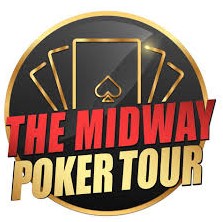What Went Wrong With the Midway Poker Tour?

The Midway Poker Tour was supposed to be the latest mid-major poker tour, but the opening even is likely to be its last event. Over the weekend, the first-ever Midway Poker Tour event played out in Chicago. However, the event proved to be a case study in how to not run a poker tournament.
Today, we take a look at where the event went wrong and whether there’s any shot of seeing future events.
The Payout Structure Not Publicized Adequately
The primary source of controversy arose over the payouts for the event. Organized as a charity tournament, the payouts work differently than a normal live poker tournament. According to Illinois Charitable Gambling Acts and regulations, organizers were only permitted to pay $500 above the initial buy-in in cash. The rest had to be in precious metals.
I probably wasn’t supposed to take this photo in the secured area, but this is what it looks like to be paid in precious metals. pic.twitter.com/7RjT7adn3z
— Chad Holloway (@ChadAHolloway) October 4, 2020
This would not be a big deal if the payout structure had been communicated to players. Apparently, it was not. It was not until the final day of the event that players found out what was going on, and things only got worse from there.
Payouts Not Adding Up
Organizers had planned to pay out players in gold and have a buyer on-site to buy back the gold. Basically, if someone won $1,000 in gold, they would take it to the buyer and he would “buy back” the gold. However, there was a problem with this.
First, the gold buyer was not permitted to be on-site and the organizers had to have enough gold on hand to cover all prizes. They could not reuse the same gold over and over. This sent organizers scrambling to buy precious metals.
Poker and silver don’t have a good track record. In 1994, Russ Hamilton won the @WSOP for $1M + his weight in gold (took 43 bars valued at $25,000). Hamilton went on to be the man behind the UltimateBet Super User cheating scandal. pic.twitter.com/aVDGi6brty
— Chad Holloway (@ChadAHolloway) October 6, 2020
What wound up happening is that organizers bought silver at $35 per ounce, paying nearly a $10 per ounce premium. As such, when players got their payouts, they were paid out based on the $35 per ounce price, and players were effectively shorted as much as 30% per player.
Tournament Organizers Vanish
Next, the people organizing the tournament effectively vanished and did not show up for the final day of the tournament. The tournament director hired for the event quit his gig after finding out the payout scheme.
Here's also something to consider w/ the Midway Poker Tour event. 266 entries X $1,100 buy-in = $292,600
$208,420 in silver acquired + $49,600 ($1,600 per 31 cashes) paid paid out for prize pool = $258,020
Leaves $34,580 ($130 fee X 266 entries). Where is that money?
— Chad Holloway (@ChadAHolloway) October 5, 2020
The only people on hand for the event were the charity representatives, and they did not have any idea of what to do. State officials were on hand to inspect payouts and were ultimately satisfied with what happened. As such, the event was allowed to play out.
Fortunately, it appears that the silver was legitimate, but definitely not worth $35 per ounce. Players had to settle for a discount on payouts in the end. At least they got paid.
Future Tours Need to Take Notice
There was a lot that happened in this event that future poker tours need to pay attention to. First, payouts need to be clearly stated before an event begins. If there are any irregularities or alternative payouts to be given, this should be communicated well before the event. If something changes during an event, players should be told immediately.
I just spoke w/ Midway Poker Tour's Dan Bekavac. He is working on getting in touch w/ all 31 cashers to make whole by making up the ~30% value difference they missed in the silver debacle. Won't be fixed overnight, but will take a little time. Will continue to monitor & update. https://t.co/DeUGBSwGx9
— Chad Holloway (@ChadAHolloway) October 6, 2020
Next, tournament organizers need to stay with the ship and own up to any issues that arise. The World Series of Poker and other tours do not run and hide when there are problems. They step up, address the issues, and correct them when possible.
There are claims that the organizer of the Midway Poker Tour is trying to scam people. If so, this is a weird way to do so. Instead, it seems much more likely that the person running the tour got over his head and was not competent to organize a major poker tour. His failure as a manager has effectively killed the new tour and will put future tours under intense scrutiny in the future.
